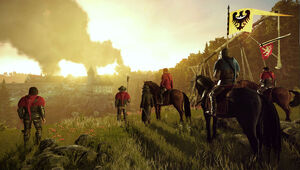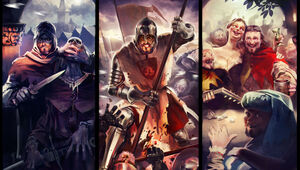Game widow (talk | contribs) No edit summary |
Game widow (talk | contribs) No edit summary |
||
| Line 10: | Line 10: | ||
[[File:Freedom-of-choice.jpg|right|300px]] |
[[File:Freedom-of-choice.jpg|right|300px]] |
||
Your character is defined by your choices. Your abilities and stats grow depending on what you do. You decide how you want to appear. Every quest can be solved in multiple ways. Branched dialogue trees grant you the freedom to express yourself. Your reputation is based on your choices, and every choice you make carries appropriate consequences. There are no class restrictions, you can do anything you want to - Stand tall as a brave knight in powerful armor, sneak behind enemy lines as an invisible thief, or win hearts as a popular bard. |
Your character is defined by your choices. Your abilities and stats grow depending on what you do. You decide how you want to appear. Every quest can be solved in multiple ways. Branched dialogue trees grant you the freedom to express yourself. Your reputation is based on your choices, and every choice you make carries appropriate consequences. There are no class restrictions, you can do anything you want to - Stand tall as a brave knight in powerful armor, sneak behind enemy lines as an invisible thief, or win hearts as a popular bard. |
||
| + | {{clear}} |
||
| + | == Branching Dialogue == |
||
| + | Conversation is an integral aspect of Kingdom Come: Deliverance, just as important as combat and just as difficult. It isn’t possible to absentmindedly click through every dialogue option. Your time to make decisions is limited, your choices affect your relationships with others, and you cannot take back what you say. Just like in real life, you have to think carefully about what you say to whom. |
||
| + | {{clear}} |
||
| + | == Quests == |
||
| + | We’re not trying to create the biggest game ever; we want to concentrate on quality rather than quantity. Instead of 200 generic dungeons, we’d like to focus on just a few, crafting each one as something unique, memorable, and special. Our world is large, but again, the focus is on creating a natural, organic space, not one so overpopulated (find out more about this in our blog, here). The same philosophy applies to quests. We don’t want to inundate players with an insane amount of quests, but rather ensure that those we have are rich in detail, with multiple solutions (including non-violent approaches, where appropriate) suiting different play styles and making an impact on the world. |
||
| + | {{clear}} |
||
| + | == Skill-based Minigames == |
||
| + | Almost everything that can be turned into a game will be playable – and that extends to crafting, as well. Blacksmithing doesn’t happen in menus but rather with a hammer at a forge. These mini-games are skill-based and affected by a player’s stats. You’ll be able to forge, sharpen, and repair weapons, create potions and ointments through alchemy, pick locks and pockets, distill alcohol, and prepare food. |
||
[[Category:Kingdom Come: Deliverance| ]] |
[[Category:Kingdom Come: Deliverance| ]] |
||
Revision as of 13:19, 22 January 2014
Story
Our tale is based on historical events and takes place in 15th century Europe. The year is 1403, and it is most certainly not the best of times. The old king is dead and his heir is weak. The new king’s brother, hungry for power allies himself with a faction of the nobility that sees this moment as an opportunity for advancement, kidnaps the king, invading the country with an army of his own to plunder this defenseless land. The aristocracy is divided between which side to support. Civil war is coming...
Hero
In the midst of this plunder and chaos, a son of a blacksmith will emerge as a hero. His home destroyed and his family murdered by the invading army, he must redeem his failure to protect those he loved and set things right again. Avenging the dead, safeguarding the kingdom’s rightful ruler, and restoring order will prove no small feat for you or our adventurer. But beware - this is not a fantasy fairytale, and you are not the chosen one! This will be a tough, dirty job that only a champion with enough wits and strength will survive.
Freedom of choice
Your character is defined by your choices. Your abilities and stats grow depending on what you do. You decide how you want to appear. Every quest can be solved in multiple ways. Branched dialogue trees grant you the freedom to express yourself. Your reputation is based on your choices, and every choice you make carries appropriate consequences. There are no class restrictions, you can do anything you want to - Stand tall as a brave knight in powerful armor, sneak behind enemy lines as an invisible thief, or win hearts as a popular bard.
Branching Dialogue
Conversation is an integral aspect of Kingdom Come: Deliverance, just as important as combat and just as difficult. It isn’t possible to absentmindedly click through every dialogue option. Your time to make decisions is limited, your choices affect your relationships with others, and you cannot take back what you say. Just like in real life, you have to think carefully about what you say to whom.
Quests
We’re not trying to create the biggest game ever; we want to concentrate on quality rather than quantity. Instead of 200 generic dungeons, we’d like to focus on just a few, crafting each one as something unique, memorable, and special. Our world is large, but again, the focus is on creating a natural, organic space, not one so overpopulated (find out more about this in our blog, here). The same philosophy applies to quests. We don’t want to inundate players with an insane amount of quests, but rather ensure that those we have are rich in detail, with multiple solutions (including non-violent approaches, where appropriate) suiting different play styles and making an impact on the world.
Skill-based Minigames
Almost everything that can be turned into a game will be playable – and that extends to crafting, as well. Blacksmithing doesn’t happen in menus but rather with a hammer at a forge. These mini-games are skill-based and affected by a player’s stats. You’ll be able to forge, sharpen, and repair weapons, create potions and ointments through alchemy, pick locks and pockets, distill alcohol, and prepare food.




